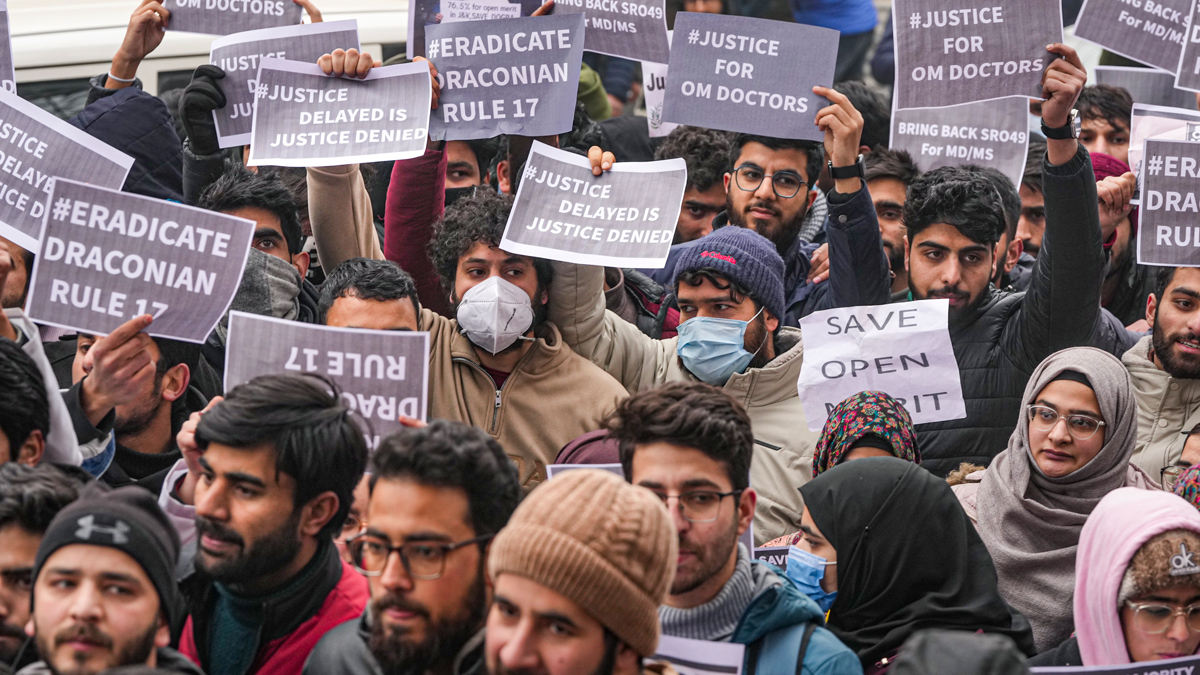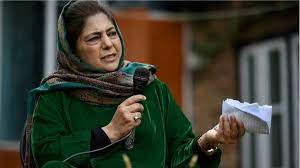‘Is It Being Marinated in Labs?’: Growing Outcry Over Opaque Reservation Review Process
By: Javid Amin | Srinagar | 27 July 2025
A Boiling Point Reached in Jammu & Kashmir
Across the political landscape and academic institutions of Jammu and Kashmir, a quiet storm has transformed into vocal discontent. What started as routine bureaucratic procedure—the submission of a Cabinet Subcommittee (CSC) report on the state’s reservation policy—has now spiraled into a full-blown public controversy. Students, educators, legal experts, and opposition leaders are all asking the same question: why is the government sitting on the report?
The sense of betrayal is most palpable among Open Merit students, who fear their aspirations are being sidelined in the name of vote-bank politics. The delay in disclosing the report, despite its submission more than a month ago, has led many to suspect the worst: political manipulation, bureaucratic red tape, or even a calculated attempt to let the issue die a silent death.
Let’s delve deep into the timeline, legal complications, political reactions, and the growing activism emerging around this issue.
Timeline of Events: How Did We Get Here?
A clear timeline can help separate fact from speculation:
June 18: The Spark
On June 18, 2025, the CSC—constituted months earlier to review and recommend revisions to Jammu and Kashmir’s reservation policy—submitted its report to the Law Department. The subcommittee, reportedly chaired by senior ministers and comprising cross-party members, had wrapped up its data gathering and public consultations.
This submission came after a cabinet meeting chaired by Chief Minister Omar Abdullah, signaling the administration’s intent to move forward on this contentious issue.
June 19–July 26: Silence and Suspicion
However, in the days and weeks that followed, there was no public communication from either the Law Department or the Chief Minister’s Office (CMO). The usual bureaucratic explanation—“awaiting legal vetting”—was trotted out repeatedly. But no timelines were given, no progress reports shared, and no press conferences held to clarify the matter.
That’s when the murmurs began: Was the report shelved deliberately?
Is the delay a tactic to avoid controversy before elections?
What are they trying to hide from the public?
This void of information created the perfect breeding ground for anger, sarcasm, and activism.
Legal Vetting or Bureaucratic Limbo?
Official Version: Constitutional Due Diligence
The J&K government has maintained that the report is under legal scrutiny to ensure its alignment with constitutional mandates, particularly in the wake of Article 370’s abrogation and the resulting legal integration with Indian constitutional standards.
According to officials, “The recommendations are being examined for their viability, legality, and socio-political implications. This is not something we can rush.”
Fair point. Legal review is essential, especially when dealing with sensitive matters like affirmative action, Scheduled Caste (SC) and Scheduled Tribe (ST) protections, and the unique political landscape of a Union Territory emerging from decades of special status.
The Counter-Narrative: “Marinating the Report in Underground Labs”
Critics have not been kind. Student unions, editorial writers, and civil society groups have mocked the delay with biting sarcasm:
“Is the report being marinated in underground labs? Or are they waiting for the political climate to change?”
Others allege a clear intent to bury the findings or edit recommendations that might provoke backlash from influential vote blocs. Given that 70% of educational and job reservations in J&K are already allocated to reserved categories, even the possibility of slight adjustments in Open Merit seats is a political minefield.
What’s at Stake? The Numbers Tell the Story
At the heart of the issue lies a bitter statistical truth:
The Current Quota Breakdown in J&K
-
Open Merit Quota: 30%
-
Reserved Categories (SC, ST, OBC, Residents of Backward Areas, etc.): 70%
This means that only 3 out of every 10 government seats or job vacancies are open to general competition, with the rest earmarked for various categories.
The CSC Report: Rumored Recommendations
Though the full content remains undisclosed, leaks and anonymous confirmations suggest the report proposes increasing Open Merit seats—possibly by tweaking certain “less-utilized” reserved categories or redefining regional backwardness criteria.
Such changes would:
-
Relieve pressure on Open Merit aspirants, especially high-achieving students
-
Trigger resistance from groups fearing a reduction in their share
-
Influence electoral loyalties, particularly in border districts and tribal-dominated areas
The stakes, therefore, are not just educational or economic—but deeply political.
Omar Abdullah’s Defense: “You Can’t Hijack Due Process”
Chief Minister Omar Abdullah has attempted to calm the waters by offering rational explanations. In a recent interview, he stated:
“This is not a press release that can be issued overnight. It’s a legal document with far-reaching consequences. You cannot hijack the process.”
He further added that if the government had any intention to delay, “we could’ve simply extended the subcommittee’s tenure.”
While the statement sounds reasoned, it did little to reassure those who are already disillusioned. Critics say the CM’s comments avoid addressing the lack of transparency and failure to provide a fixed timeline, which are the real sources of public frustration.
The Voice of Students: “Merit Is Not a Crime”
Open Merit students have been the most vocal group in the ongoing agitation. Thousands have taken to social media using hashtags like #MeritMatters, #EqualOpportunityJK, and #ReservationReformNow to demand clarity.
Their Main Demands:
-
Immediate public release of the CSC report
-
Clear timeline for implementation or rejection
-
No reduction in already limited Open Merit seats
Some have even gone further, calling for a Judicial Commission to independently examine reservation policies in light of post-370 constitutional restructuring.
One student at the University of Kashmir summed up the sentiment perfectly:
“We’re not against social justice. But social justice must include us too. Merit should not be a crime.”
Opposition and Civil Society: A Rare Unity Emerges
Interestingly, the report delay has united groups who are usually on opposite sides of the aisle. Leaders from the National Conference, PDP, Congress, and even Apni Party have issued cautious but pointed critiques.
Key Political Statements:
-
Mehbooba Mufti (PDP): “The future of Kashmiri youth cannot be held hostage to vote-bank politics.”
-
Ghulam Nabi Azad (DPAP): “Transparency must be the cornerstone of governance. Release the report.”
-
Ravinder Raina (BJP): “We are committed to constitutional rights, including for the Open Merit students.”
Civil society activists, retired judges, and prominent academicians have added their voices to the chorus, urging public debate and parliamentary scrutiny of the reservation policy.
What Lies Beneath the Delay? Political Calculus and Electoral Anxiety
Why would the government stall something it initiated?
The answer may lie in political timing and electoral anxiety. With panchayat and municipal elections approaching in Jammu and Kashmir, the ruling administration might be reluctant to alienate either side of the reservation divide.
Releasing a report that rebalances quota shares—even slightly—could:
-
Trigger unrest in reserved-category strongholds
-
Be used by opposition parties to inflame identity politics
-
Lead to protests or even litigation from either side
Thus, delaying the inevitable becomes a form of silent damage control.
The Bigger Picture: Meritocracy vs Representation
This debate isn’t just about one report. It reflects a larger ideological conflict in India and J&K alike:
-
Should merit alone be the benchmark for opportunity?
-
Can historical injustice be undone without compromising present fairness?
-
Is it time to reassess reservations in light of new socio-economic realities?
As J&K transitions from its unique Article 370 status to a standard Union Territory, it must also decide whether it wants to cling to old systems or reimagine them through transparent, evidence-based reforms.
What Happens If This Delay Continues?
The longer the government withholds the report, the more volatile the situation is likely to become.
Possible Consequences:
-
Student protests and campus unrest
-
Petitions in court under Right to Information (RTI) or violation of constitutional rights
-
Loss of faith in administrative neutrality
-
Amplification by media and civil society, both inside and outside J&K
Transparency, clarity, and communication are the only ways to de-escalate this ticking time bomb.
Way Forward: What Must the Government Do?
For the Omar Abdullah-led administration, the path forward requires courage, clarity, and communication. Specifically, the government should:
-
Publicly disclose the CSC report within a fixed deadline
-
Invite public and expert feedback on the proposed changes
-
Ensure judicial scrutiny if necessary, to give the policy legal standing
-
Provide a transition roadmap for students and job applicants
-
Avoid knee-jerk decisions, and opt for evidence-based reform
Bottom-Line: This Isn’t Just About a Report—It’s About Trust
The delay in releasing the Jammu and Kashmir reservation report is not merely an administrative hiccup. It has become a symbol of deeper anxieties—about transparency, fairness, and the value of merit in a complex, divided society.
By keeping the public in the dark, the government risks undermining both constitutional credibility and public trust.
In a region that has long struggled with disenfranchisement, every decision matters—especially one that defines who gets to compete for a better future.
If J&K wants to build a future that rewards talent while honoring its social fabric, the time to act is now.


